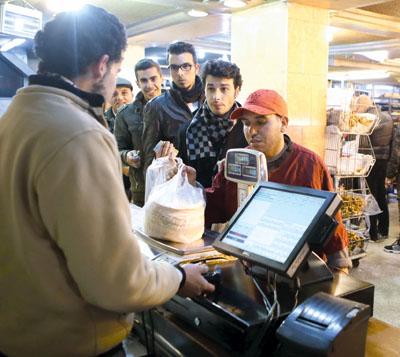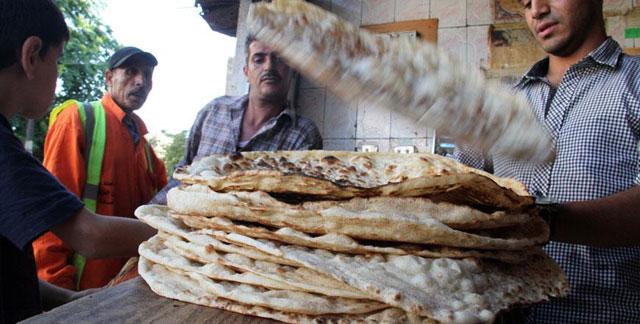You are here
Gov’t announces new price list for bread
By Ahmed Bani Mustafa - Jan 08,2018 - Last updated at Jan 08,2018

Industry, Trade and Supply Minister Yarub Qudah speaks to the press in Amman on Monday (Petra photo)
AMMAN — The government on Monday announced the new prices for bread as of February 1, after lifting decades-long subsidies.
At a press conference, Minister of Industry, Trade and Supply Yarub Qudah said that the prices will be JD0.40 for small pita bread, JD0.32 for large pita bread and JD0.35 for Arabic bread (Mashrouh) per kilogramme.
Qudah told reporters that the prices will remain unchanged till the end of 2018 as the Kingdom has sufficient reserves of wheat.
Other products of bakeries, which are already not subsidised, will not be affected by the new decision, the minister added.
With this measure, Qudah said, the government will save JD50 million in subsidies that used to amount to around JD120 million annually, of which only JD45 million was directed to Jordanians as more than a third of the population are non-citizens and have been benefiting from the subsidy system.
He said that 35 per cent of the population are not Jordanians, and they consume 40 per cent of the bread.
“Jordanians consume 35 per cent [of the bread], 40 per cent go to non-Jordanians and 25 per cent go waste,“ the official said, citing studies.
The minister said the new approach is based on supporting people not commodities.
"Several countries around us have switched from supporting commodities to supporting citizens,” Qudah said, adding that the cash compensation will be delivered to those who deserve it.
Responding to a question on the effect of the decision on local restaurants, the minister stressed that he does not expect them to raise their prices.
Qudah said that the price of a tonne of flour on the markets stands at JD235, while the government sells it to bakeries for JD50, noting that supporting the commodity used to create black markets and lead to other illegal practices.
On the mechanism of delivering the cash support (which totals JD171 million in a form of a social safety net), Qudah said that the government will support military and civil public employees and retirees of military, government and the Social Security Corporation, in addition to the beneficiaries of the National Aid Fund by transferring the cash subsidies to their salaries without the need to apply.
The rest of support-eligible citizens will receive the support quarterly or biannually by subscribing to the government site (www.da3mak.jo) and app (daamak) and filling in the national number, the number of family members, monthly income and the bank account.
For those who have no bank account or do not want to open one, the government will choose one or two banks where beneficiaries can receive their subsides any time of the year.
Children of Jordanian women married to non-Jordanians are eligible for the cash subsidy.
So far, 200,000 people have applied to the website, the minister said.
For his part, Bakery Owners Association President Abdul Ilah Hamawi said at the presser that the bakeries will comply with the government price policies and instructions.
Hamawi expected a reduction of bread consumption after applying the new mechanism, as it would lead to changing the consuming patterns.
Related Articles
AMMAN — The new bread prices after the government subsidy was lifted went into effect on Saturday, and will remain valid until December 31.O
Most consumers in Jordan throw away nearly a quarter of the bread they buy, according to estimates, a figure seen by officials as alarming enough to call for reviewing the subsidy system.
AMMAN — Bakery Owners Association President Abdul Ilah Hamawi on Wednesday said the Ministry of Industry, Trade and Supply’s decision to ope

















